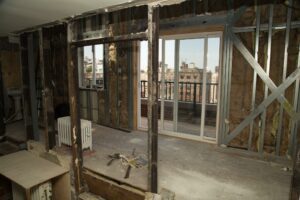WHAT YOU NEED TO KNOW BEFORE COMBINING TWO APARTMENTS IN NYC
Are you considering combining two apartments in NYC? It can be a great way to get more space without buying a new, single large unit. But before you go any further, here are a few important things about the process and the approvals that you’ll need.
With over twenty years of experience in the field of contracting and remodeling apartments in New York City, our experts at NYKB will walk you through everything you need to know about apartment combinations. Not sure about apartment combination costs, assessing walls for demolition, permits required, required regulations from the NYC DOB for combining apartments, or any other factors? Read on for a comprehensive rundown of what you should keep in mind when considering joining two apartments together.
WHAT ARE THE BENEFITS OF COMBINING TWO UNITS INSTEAD OF BUYING ONE LARGE ONE?
Combined apartments create a greater space without needing to purchase a larger unit.. This is often more cost-effective since you’ll only have to pay for home remodels and permits once instead of buying an entirely new unit. Additionally, it gives you the flexibility to design your own space based on the details and layout of both existing apartments. Your home renovation can include custom designs like open-concept kitchens or spacious bedrooms.
These designs would otherwise be impossible to achieve working with just one large unit.
DOES COMBINING APARTMENTS INCREASE OR DECREASE VALUE?
Combining apartments in NYC often increases the value of the property, yielding a higher resale value. It will also improve the property values in your neighborhood.
APARTMENT COMBINATION COSTS IN NYC
On average, combining two units in NYC will cost anywhere between $50 – $200 per square foot, depending on various factors. For instance, structural changes like wall removal can make home renovation more expensive.
You should also take into consideration the professional services you’ll need for the project. Although DIY options seem reasonable initially, simple mistakes due to a lack of proper knowledge can be costly.The best move is to hire experienced professionals to advise and help, such an NYKB. Experts in the field already have extensive experience handling similar projects in NYC. You can rest assured that they have the knowledge to do everything correctly and safely without any surprises along the way!
FINANCING OPTIONS FOR COMBINING APARTMENTS
Financing for combining apartments can be complex, but the first step is determining how much you need. Generally, this will depend on the size of your project and any additional fees – such as permits or materials and the like.
It’s also important to consider any existing restrictions due to fire codes or other safety protocols. Such limits could significantly impact your budget. Once you have a ballpark figure in mind, it’s time to start looking into what financing options are available to you.
Depending on your situation, this could include:
- Personal loans from banks or credit unions
- Government grants
- Home equity lines of credit
Ultimately, each option has its advantages and drawbacks. Make sure to do thorough research before committing to one financial solution over another.


Permits and Regulations to Consider When Joining Two Apartments Together
Before you combine apartments, it’s essential to know the regulations and permits that are required in your building. Read on for a more detailed explanation of the process.
DO YOU NEED PERMITS TO COMBINE TWO APARTMENTS IN NYC?
If you’re planning on combining two apartments in NYC, the first step is to obtain the proper permits from the Department of Buildings (DOB). The requirements from the NYC DOB for combining apartments can make this a complicated process. So, it’s crucial to understand precisely what you’ll need before submitting your application.
The most common type of permit for this project is an Alteration Type 1 Permit. This permit allows you to make structural changes and add new equipment or fixtures. You may also need additional permits depending on the scope of work – such as one for electrical hookups or for plumbing installation.
In addition to regular building permits, there are also special considerations when combining two condo units into one, or when combining apartments in a co-op in NYC.
These may require extra paperwork or approvals that must be completed before starting any home remodels. For example, showing proof that you have sufficient funds for all associated costs and fees may be necessary.
Ensure you research these regulations so that the permitting process is as smooth as possible. Alternatively, you can work with experienced professionals to help you complete all permit requirements.
WHAT DEPARTMENT OF BUILDINGS (DOB) RULES DO YOU NEED TO KNOW?
When it comes to the Department of Buildings (DOB), you need to know the NYC building codes before starting your home remodel in NYC. You should also have an understanding of what type of permit you’ll need for your project, and how long it will take to obtain one from the DOB.You must obtain special approval from all applicable co-op or condo boards to combine two apartments.
Before applying for a permit with the DOB, consult a professional engineer or architect. The building code compliance specialist should review your drawings, plans, and paperwork.It will help ensure that everything meets local laws and regulations. You can avoid costly delays due to incorrect documentation.
Also, don’t forget about additional permits depending on any specific features in your project. Some examples are electrical hookups or plumbing installation. These must also comply with strict safety standards set by city and state governments before any work begins.
COMBINING APARTMENTS IN A CO-OP OR CONDO
DO NYC CO-OP AND CONDO BOARDS APPROVE COMBINATION REQUESTS?
When it comes to NYC co-op and condo boards, the approval process for combination requests can vary significantly.The board will assess whether the building structure is suitable for a combination project. Once the board does so, they review any necessary permits that you need from the Department of Buildings.Depending on their decision, they may also ask for proof that you have enough funds. You must have funds to cover the home remodel and relevant fees associated with the project. Other tenants may live in apartments or common areas affected by construction work. In that case, your application may require special approval from them too.
Every co-op or condo board has its regulations and policies. It’s therefore important to research them before submitting your application. Talking directly with them about any particular concerns or questions is also helpful. This way, you know exactly what to do before starting your home renovation.
Learn more about building requirements for remodeling your co-op.
IS THERE MORE PAPERWORK TO COMBINE APARTMENTS IN A CO-OP OR CONDO?
Yes, more paperwork is usually involved when combining apartments in a co-op or condo.
This is because the building’s board of directors must first approve any changes made to the existing floor plan before you can move forward.
In addition to submitting plans and drawings for review, you may also have to provide additional documentation — for example, letters from contractors outlining their proposed work and estimated costs.
Furthermore, depending on the size of your project, you may need to present an impact statement. The statement considers how much noise or disruption the construction works will cause. You may require further approvals from local authorities in such a case.
EXPANDING INTO A BUILDING’S COMMON SPACE
When considering expanding into a building’s common space, it’s important to understand the rules and regulations of your co-op or condo board in regards to this.Details you will need to find out include:
- How much of the building’s shared space you can utilize for personal use.
- The maximum square footage allowed for each expansion project.
- Any additional fees you may incur during construction.
- Remember to check for any existing restrictions in place due to fire codes or other safety protocols.
It would also be helpful to research the building’s layout to adequately plan where your new space will go within its confines. You should then create a detailed proposal outlining all aspects of your project, including:
- Estimated costs
- Materials needed
- Timelines and more
Lastly, remember any necessary permits, such as plumbing or electrical installations. These processes also require extra paperwork, depending on your intended changes. Instead of dealing with all these complex processes, you can choose to work with experienced professionals who understand all the requirements and procedures. They will be able to guide you through every last detail.
DIFFERENCES BETWEEN HORIZONTAL AND VERTICAL APARTMENT COMBINATIONS
When it comes to combining two apartments, there are two main approaches – vertical and horizontal.
Vertical combinations involve adding a new floor above or below an existing space to create an additional living area. This can be ideal if you’re looking for more square footage but don’t have the budget to purchase another unit outright. However, this option can also be quite disruptive. It involves major structural renovations that may require permission from local authorities.
On the other hand, horizontal combinations involve joining adjacent units together, for example, by removing walls or expanding into common areas such as hallways and closets.
It is less intrusive than vertical expansions and often doesn’t require any extra permits.However, it comes with challenges, such as ensuring all home remodels meet safety regulations. You’ll also have to coordinate work between multiple owners for everything to go smoothly. Both options offer unique benefits depending on your specific needs. So, consider each before deciding which best suits you and works for your space.
WHAT DO ARCHITECTS CONSIDER WHEN COMBINING APARTMENTS?
Architects must evaluate several factors when combining two apartments in NYC to ensure the project is successful. Firstly, they consider existing building codes and regulations regarding any changes to the floor plan.
This includes things such as:
- Fire safety requirements
- Maximum occupancy levels
- The experts also evaluate the structural integrity of each wall or ceiling before making any alterations. It ensures that new load-bearing walls can safely support the weight of additional rooms being added.
Architects also factor in estimated costs, including:
- Fees for special permits
- Materials required for construction works, and many more.
Finally, the architect will create a detailed proposal outlining all aspects of the project. The proposal will include timelines and deadlines. You’ll use this document for the building’s board of directors and local authorities to gain approval before work can begin.
IS COMBINING TWO APARTMENTS IN NYC WORTH IT FOR YOU?
Combining two apartments into one – whether it’s a co-op, condo, or rent-stabilized unit – can be advantageous in New York City real estate. With a thorough understanding of DOB rules and regulations, the process can be successful.However, it’s essential to consider all factors involved before taking the plunge. Think of everything from legal requirements and estimated costs to what financing options are available.
The process can be overwhelming, especially without any construction background! That’s why experts from NYKB are ready to work with you. You can count on us for expert guidance, from the planning and design stage, to permits and throughout all of your home renovation.
The goal of renovation and remodeling is to ensure absolute satisfaction upon completion of your project. Construction can be very frustrating, and without a professional contractor, things can go wrong.
Book your free consultation and let our NYKB experts handle all the heavy lifting. With over 20 years of experience improving homes in New York, we at NYKB have what it takes to transform your home.

